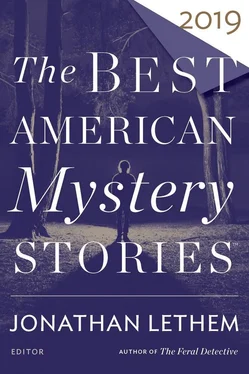• “Inside Man” was a different writing experience for two reasons: first, Down & Out editor Rick Ollerman, who accepted the story “conditionally,” worked me over in the details, grammar, and word choice until he was satisfied, and we’re talking weeks, not days. I don’t think the Dead Sea Scrolls received as much critical attention, and for his keen eye, and that story’s place in this prestigious anthology, I’m very grateful.
The other reason is that my narrator fits a niche I’ve tried before to squeeze my other narrating criminals into — and not always successfully. Cold-bloodedness doesn’t always work well with the jocular. If it does work here (I defer to the reader), then my ex-con’s heist borders on a kind of hopeless, disciplined lunacy that will affect the reader as I intended. Mindful of those readers who like to peruse a writer’s notes before taking up the story, I’ll say no more about it here.
I suppose, as a crime-fiction writer who turned late in life to writing fiction, I was never tempted by elaborate plots or clever characters. The thrill has always been in a character’s self-revelation through a brutally honest introspection in that neutral zone between writer and reader. This also speaks to my natural antipathy to avoid anything remotely “cozy” in my fiction. I made it to page 25 of my one and only Agatha Christie novel (title forgotten over the decades since) before that paperback went flying into the garden, where it did more good as compost than if I’d forced myself to finish it — not finishing a book begun being a lifetime taboo, not easily violated then or now. I think it was Browning who was chided by his wife in a letter for his lack of spirituality, or something similar, and he responded with a line I’ve regrettably forgotten and won’t try to paraphrase. The gist was that we all need an “appreciation” for evil. For that, an unblinking gaze is required. Stories serve as a prism for that. Hard to do in any era but in our time where everything is psychoanalyzed and nuanced, dissected and filtered through a collective and increasingly more delicate sensibility, it’s almost impossible to do. Let the shrinks and behaviorists scoff. I deplore academe’s desire to eradicate the word evil from our consciousness.
Genre fiction also gives us something besides entertainment and is worth the effort Rick Ollerman and every good editor or publisher demands. Besides, unless I’m wrong about anthropology’s origins, the more violent chimpanzees came out of the trees first, not the gentler bonobos, those sexualized apes from the simian tree. I place my hope in the future of humankind there — in the heavens, the Milky Way, to be precise. If there really are a hundred billion stars swirling about the black hole in the center, then about half should be surrounded by planets, as the astronomers tell us. That increases the odds mightily that there might really be intelligent, civilized life in the universe. It’s just not down here very often.
Ted Whitebegan his writing career as a jazz critic, writing for Metronome magazine in 1960. Since then he has been a science fiction writer (more than a dozen novels, many short stories) an editor (assistant editor of The Magazine of Fantasy and Science Fiction for five years; editor of Amazing Science Fiction and Fantastic Stories for ten years; editor of Heavy Metal for one year; editorial director of Stardate for one year), an agent (at the Scott Meredith Literary Agency, then solo), an FM radio deejay, and a musician (winds and keys) still currently in a band, Conduit. He has lectured at the Smithsonian Institution. He is currently the copy editor of the Falls Church News-Press, a local weekly.
• This is one of my favorites among the stories I’ve written recently. I was most active as a writer in the 1960s and 1970s, but returned to short stories in 2013, essentially in retirement from the mundane jobs I’d held for the previous two decades. Nikola is a character with whom I fell in love when I wrote this story. I admire her literacy and her guts. She lives alone in a grim world, but she’s a survivor.












